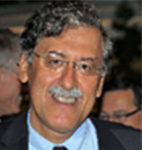

 Prof. Kostas Spyrou
Prof. Kostas Spyrou Professor of Dynamic Stability and Safety of Ships, Dean of the School of Naval Architecture and Marine Engineering. A graduate of the same School, he received his PhD from the University of Strathclyde in Glasgow where he holds the honorary title of Visiting Professor. He stayed for two years in Japan as post-doctoral researcher, sponsored by the Japanese Science and Technology Agency. He spent another two years at University College London (UCL) and, more recently, at American Bureau of Shipping (Houston). His research has been supported by national and international organizations, including the US Office of Naval Research and the European Commission. He is the Chairman of the International Standing Committee on the Stability of Ships and Ocean Vehicles. He is Fellow of the Society of Naval Architects and Marine Engineers (SNAME - USA) and of the Royal Institution of Naval Architects (RINA - UK).
A brief analysis of the particular areas, advantages and needs for sea transportation of natural gas in compressed form versus pipe lines or liquefied systems.
An overview of the presently available sources of natural gas worldwide with particular emphasis to the Mediterranean area.
The determination of the areas where CNG transportation can better serve consumers needs where pipe line or LNG systems are not viable or not economical.
The determination of the ideal size of a CNG vessel and of the maximum distances that CNG transportation can be an easier, faster and more economical from the other two systems,
A detailed description of a Prototype Autonomous CNG carrier vessels which is anticipated to cover the needs that could not be served by the other two systems.